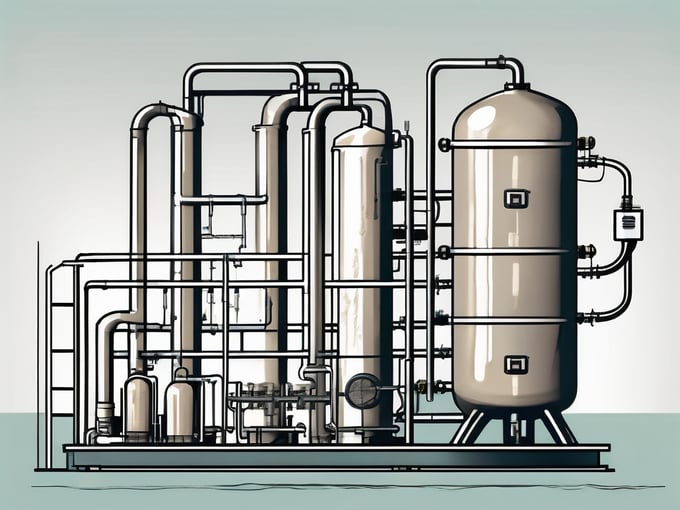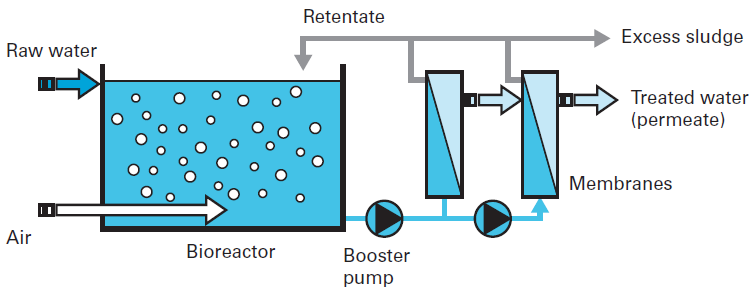How Membrane Bioreactor Contributes to the Reduction of Energy Consumption in Water Treatment
How Membrane Bioreactor Contributes to the Reduction of Energy Consumption in Water Treatment
Blog Article
The Benefits of Membrane Layer Bioreactors in Sustainable Wastewater Administration
Membrane layer bioreactors (MBRs) stand for an essential innovation in lasting wastewater monitoring, efficiently combining organic therapy with innovative membrane filtering innovation. As the need for lasting remedies magnifies, discovering the diverse benefits of MBRs might expose unforeseen ramifications for the future of wastewater therapy systems.
Summary of Membrane Bioreactors
Membrane layer bioreactors (MBRs) represent a substantial advancement in wastewater therapy technology, integrating biological deterioration with membrane layer filtering to boost the performance of the treatment process. This cutting-edge system combines the benefits of traditional activated sludge processes with membrane layer modern technology, allowing for improved solid-liquid splitting up. MBRs make use of semi-permeable membrane layers to different treated water from biomass, resulting in high-quality effluent that can be recycled or safely released into the environment.
The functional style of MBRs commonly involves a bioreactor where bacteria break down raw material, adhered to by a membrane layer device that filters the combined liquor. This arrangement not just minimizes the footprint of the therapy facility but likewise allows for greater biomass focus and decreased hydraulic retention times. MBRs are qualified of dealing with a bigger array of pollutants, including virus and nutrients, making them appropriate for numerous applications, from community wastewater therapy to commercial effluent handling.
The assimilation of MBRs right into wastewater management systems is a sign of an expanding trend towards efficient and lasting techniques in ecological engineering. Their capability to produce top notch effluent while lessening space demands positions MBR modern technology as a crucial gamer in modern wastewater treatment options.
Improved Effluent Quality

The membrane purification process acts as a physical obstacle, allowing the retention of microbes and particle issue, which adds to a clearer and cleaner effluent (Membrane Bioreactor). MBRs run at higher biomass focus than traditional triggered sludge systems, promoting a lot more reliable biodegradation of toxins. This results in a reduction in biochemical oxygen need (FIGURE) and total suspended solids (TSS) degrees in the final effluent
Furthermore, MBRs demonstrate outstanding performance in treating challenging wastewater compositions, such as industrial effluents and wastewater with high nutrient tons. Therefore, the effluent produced is often of higher high quality, permitting more flexible disposal options and decreased ecological influence. Ultimately, the enhanced effluent high quality accomplished via MBR modern technology emphasizes its essential duty beforehand sustainable wastewater management practices.
Water Reuse Opportunities
The high-grade effluent generated by membrane layer bioreactors (MBRs) opens up substantial possibilities for water reuse in numerous applications. MBRs effectively remove impurities, including virus, put on hold solids, and raw material, leading to cured water that meets or goes beyond governing requirements for reuse. This high quality permits the execution of water reusing efforts throughout varied markets.
One noticeable application is in farming, where dealt with wastewater can be used for irrigation, promoting sustainable farming practices while saving fresh water resources. Furthermore, MBR-treated effluent can be utilized for commercial processes such as air conditioning, cleansing, and as a process water resource, substantially lowering the need for drinkable water in these operations.
In useful source city atmospheres, MBRs assist in making use of reclaimed water for landscape watering, toilet flushing, and various other non-potable uses, adding to the general strength of water systems. The integration of MBR technology in decentralized systems aids in handling local water demands, particularly in water-scarce regions.
Decreased Environmental Impact
Just how can the adoption of membrane bioreactors (MBRs) add to a decreased ecological impact in wastewater monitoring? MBRs dramatically boost the treatment performance of wastewater while lessening environmental disruptions. By integrating organic treatment procedures with membrane layer filtering, MBRs effectively get rid of a vast array of contaminants, consisting of raw material, nutrients, and virus. This advanced filtration causes higher-quality effluent, which is critical for securing marine ecosystems and minimizing the worry on natural water bodies.
Moreover, MBRs operate at reduced hydraulic retention times contrasted to standard systems, resulting in smaller sized treatment plant footprints. This portable design lowers land use, consequently protecting all-natural environments and biodiversity. The process additionally generates much less sludge than conventional approaches, reducing disposal obstacles and decreasing greenhouse gas discharges connected with sludge management.
Additionally, MBRs promote the healing of useful sources, such as water and nutrients, adding to a circular economy. By enabling water reuse for irrigation or industrial procedures, MBRs assist minimize freshwater deficiency, therefore advertising lasting water use methods. Inevitably, the fostering of MBR modern technology represents a significant stride in the direction of lessening the ecological impact of wastewater administration systems.
Financial Benefits of MBRs

In addition, MBRs assist in the manufacturing of premium effluent, which can be recycled for different applications, such as agricultural irrigation and commercial procedures - Membrane Bioreactor. This reuse capacity can dramatically reduce water procurement prices, providing a monetary incentive for industries facing stringent water regulations
The small design of MBR systems additionally causes minimized land requirements, which is especially useful in metropolitan locations where genuine estate is costly. By minimizing room, industries and towns can conserve on land acquisition and upkeep expenses.
Additionally, MBRs typically require less regular upkeep and have a longer life-span than traditional systems, additionally contributing to cost financial savings. In recap, the financial advantages of MBRs-- ranging from reduced functional prices to land savings and effluent reuse-- make them an engaging selection for sustainable wastewater monitoring, supplying both lasting and prompt economic benefits.
Conclusion
Membrane layer bioreactors represent a transformative approach to sustainable wastewater management, imp source integrating biological treatment with sophisticated membrane layer filtering for remarkable effluent quality. Their capability for efficient pollutant removal facilitates water reuse, thus saving crucial freshwater sources. Additionally, MBRs add to reduced environmental effects via portable designs and lower sludge generation. Economic benefits better boost their viability, making MBRs an appealing option for resolving the challenges of wastewater treatment and promoting sustainable resource management.
Membrane layer bioreactors (MBRs) represent a critical development in sustainable wastewater management, effectively combining organic treatment with sophisticated membrane purification modern technology.Membrane layer bioreactors (MBRs) represent a significant advancement in wastewater therapy modern technology, integrating biological degradation with membrane layer filtering to enhance the efficiency of the therapy process.Achieving boosted effluent top quality is one of the most considerable advantages of making use of membrane bioreactors (MBRs) in wastewater treatment.In addition, MBRs demonstrate excellent efficiency in treating challenging wastewater make-ups, such as commercial effluents and wastewater with high nutrient lots.Incorporating membrane bioreactors (MBRs) into wastewater administration not just decreases environmental effect but additionally provides significant financial why not try this out advantages.
Report this page